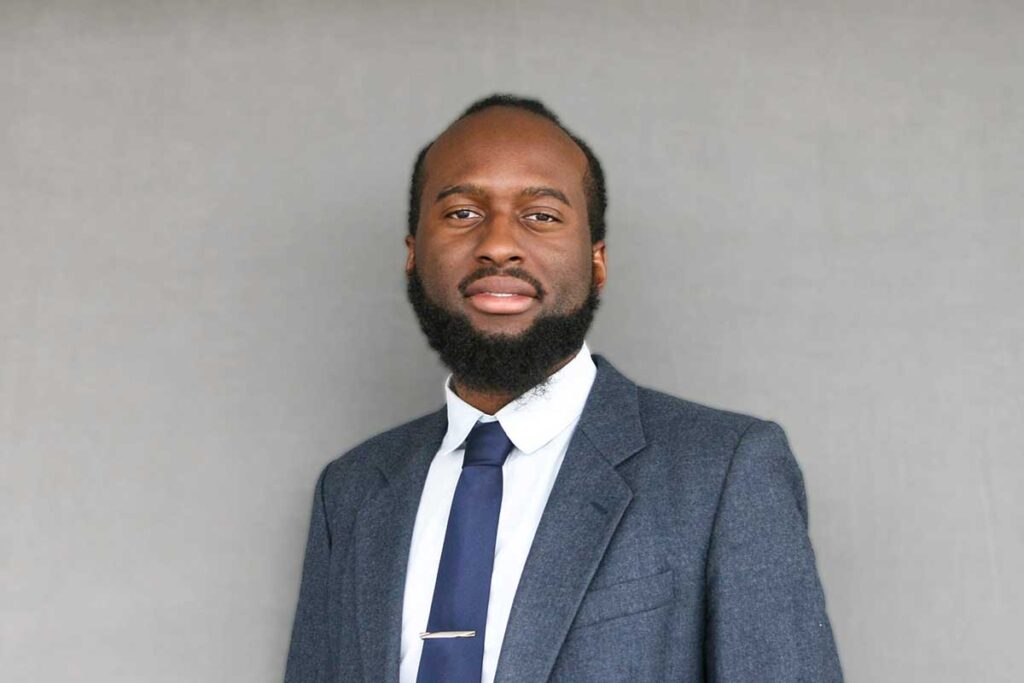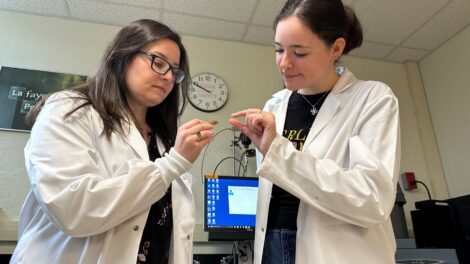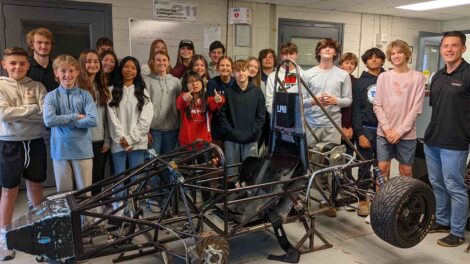Engineering success story: Mosi London ’10
Mosi London ’10 is a principal planner at Arlington County Department of Environmental Services in Virginia, where he plays a critical role in shaping the efficient and equitable use of local curb space. He is responsible for reviewing and evaluating site plans, parking garage designs, and parking management plans to ensure compliance with county ordinances and regulations. London also provides expert recommendations and guidance to development teams, ensuring projects align with community goals. By optimizing curb space utilization, he helps create a more efficient transportation system with diverse options, reduce traffic congestion, and improve accessibility—contributing to a more sustainable, vibrant, and livable Arlington County. London holds a Master of Science and Ph.D. in transportation engineering from University of Delaware. He also earned a Bachelor of Science in civil and environmental engineering from Lafayette College.

Mosi London ’10 is the principal planner at Arlington County Department of Environmental Services in Virginia
What do you love about the work that you do? How does it feel to make such a positive impact on the community?
I find immense satisfaction in the work I do for several reasons. My work directly impacts the lives of countless residents, businesses, and visitors in Arlington County. It allows me to use my skills and knowledge to make a tangible difference in people’s lives, contribute to a more sustainable future, and shape the future of urban transportation for the better. My main goal each day is to leave the county a little bit better than I found it.
What sparked your interest in transportation? Was this something you always wanted to do?
While I was always fascinated by the built environment and its intricate systems, my passion for transportation blossomed unexpectedly from countless hours spent playing The Sims and meticulously crafting virtual homes, communities, and cities. It was through this playful exploration that I discovered my deep interest in how infrastructure not only fuels economic activity, but also shapes the very fabric of opportunity. This realization sparked a flame that continues to burn brightly within me today.
Although I dreamt of becoming an engineer, I initially gravitated toward civil engineering without complete conviction. It wasn’t until I enrolled in Introduction to Engineering that a crystal-clear certainty washed over me. This course opened my eyes to the vast possibilities within the world of transportation engineering, and I knew, without a shadow of a doubt, that this was the path I was meant to walk.
Were there any professors, courses, or experiences that were particularly influential to you during your time at Lafayette and that continue to impact your work today?
While my entire Lafayette experience laid the groundwork for my current career, several specific professors, mentors, courses, and activities particularly shaped my trajectory and continue to influence my work today. As my EXCEL Scholar adviser and academic adviser, Prof. Kristen Sandford introduced me to the fascinating world of agent-based modeling. Her guidance and support continue to inspire me to explore innovative approaches to solving complex transportation challenges.
My EXCEL research project with Prof. Sanford was particularly impactful. Much like my childhood fascination with The Sims, this research allowed me to create a virtual world, this time populated by intelligent agents whose behaviors and interactions were governed by real-world data and heuristics. This experience enriched my understanding of the construction industry and its nuances. It helped me hone my analytical skills, taught me how to apply critical thinking, and instilled in me a strong problem-solving approach—which continues to be invaluable in my work today. Beyond the technical skills and knowledge gained, this project fostered a deep appreciation for the power of simulation and modeling in understanding real-world phenomena. It taught me how to leverage these tools to analyze complex systems, identify potential challenges, and ultimately design better solutions for the future of transportation.
Also, my study abroad journey to study water resources and environmental engineering in New Zealand with Prof. Arthur Kney wasn’t just about academics; it was about broadening my scope and enriching my perspective on the world. Immersing myself in a country with such diverse landscapes, from the snow-capped mountains of the Southern Alps to the pristine beaches of the North Island, was truly awe-inspiring. I was also exposed to how transportation systems are designed and built, where roundabouts have a common mainstay in the country and have only recently started to appear more in the U.S.
How did your other experiences at Lafayette help lay the foundation for your career?
My Lafayette degree played a crucial role in setting the foundation and building the necessary technical skills I utilize in my work today. My liberal arts education at Lafayette provided me with a comprehensive understanding of various disciplines, including economics and ethics. The rigorous academic environment at Lafayette honed my critical thinking and problem-solving skills. Through coursework and research projects, I learned to analyze complex situations, identify key issues, and develop effective solutions.
The most valuable aspects of my experience transcended the purely academic. The fast-paced world of engineering and transportation requires constant learning and adaptation to new technologies and trends. Lafayette’s emphasis on lifelong learning fostered my curiosity and instilled in me a growth mindset. I learned to embrace challenges, seek new knowledge, and adapt to changing circumstances, preparing me for the continuous evolution of my chosen field.
What are your goals for the future?
I am driven by a vision of ‘changing the world one curb space at a time.’ Specifically, I hope to build a future where our cities are more sustainable, equitable, and accessible for all. To achieve this, I have set several ambitious goals for myself. Curb space management is not just about parking; it’s about reimagining how we use and design our cities. My long-term goal is to influence the future of urban planning by advocating for policies and design principles that prioritize sustainability, equity, and accessibility. I envision cities where streets are vibrant public spaces, where walking, cycling, and public transit are the preferred modes of transportation, and where curb space is utilized efficiently to serve the needs of all residents, businesses, and visitors.
What kind of advice can you offer to current engineering students about how to apply what they’re learning to their future careers?
The main piece of advice I can offer current engineering students is to focus on how to bridge the gap between theoretical knowledge and practical application in their future careers. Ways to do this include focusing on the fundamentals—a solid foundation in core engineering principles is paramount. Seek real-world experience: Participate in internships, co-ops, and research projects to apply your classroom learning to practical problems. And lastly, develop strong communication skills; they are crucial for success in any engineering field. Learn to articulate complex technical concepts clearly and concisely, both verbally and in writing.

